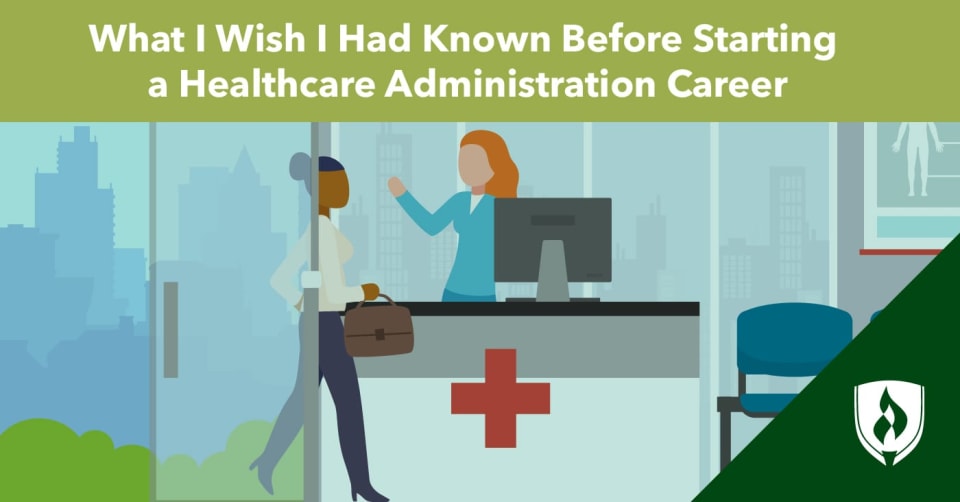What I Wish I Had Known Before Starting a Healthcare Administration Career
By Will Erstad on 05/04/2023

If you ask a group of kindergarteners what they want to be when they grow up, you’re unlikely to hear the words “healthcare administrator.” Even for high school graduates, jobs in healthcare management and administration aren’t often on the radar. These careers can be an incredible choice for the right person, but how do you know if that’s you?
A healthcare facility is far more complicated to manage than a typical business office. Healthcare regulatory compliance is more intense than what an average business corporation navigates, and on top of all that—healthcare organizations have thousands of lives depending on them. We need healthcare administrators and professionals in healthcare management who can make wise decisions with empathy and strategy.
Discovering your own aptitude or interest in this field will require some more details.
If you're sizing up a healthcare administration career, there's a lot you can learn from the professionals who are already deep into their careers. That's why we asked experienced healthcare administrators to offer up their thoughts on what surprised them about the field and their advice for those getting started.
First, a quick clarification.
Healthcare administration vs. healthcare management
Since these terms are often used interchangeably, it's worth clarifying that healthcare administration is the larger field that healthcare management falls under. While the difference in these terms appears most often in academics (when you’re choosing degree programs), healthcare administration tends to involve a bigger scope of work, while healthcare management might be connected to departments within a health system.
Overall, the job responsibilities have a lot of overlap. Plus, the Bureau of Labor Statistics (BLS) treats medical and health services managers, healthcare executives and healthcare administrators as subtle variations of the same career.1
9 Things you should know before starting a healthcare administration career
Ready to advance your career in healthcare administration?
Explore Rasmussen University's Healthcare Management degree programsWant a peek at what life is like for a healthcare administrator? Here's what healthcare administrators say they wish they'd known back when they began their work.
1. You have to follow a ton of regulations and policies
While it's probably not a surprise that healthcare organizations making life-and-death decisions every day have to follow strict rules, you may be caught off guard by their complexity when first starting out. Albert Ho, consultant and founder of Healthcare Heroes, says he was surprised by health policy nuances and the number of procedures required to run healthcare facilities.
“It is a maze of policies with sometimes opposing recommendations,” Ho explains.
As an example, Ho says one healthcare facility banned personal glucose testing devices, even though some patients need glucose testing up to three times a day. While that may seem like a strange decision, a good healthcare administrator needs to dig into the reasons behind each policy to understand if they should change. In this case, the personal glucose devices came with risks such as unknown calibration or improper storage that could harm patients.
“Our staff need to have reliable information to provide care,” Ho says.
Policy examples like this may frustrate those who prefer to make fast changes. Healthcare administrators need to bring their patience to work and remember that complicated policies are there to protect patients, and every decision needs to be carefully considered.
2. Health administrators have diverse opportunities
You might think healthcare administration is limited to managing a small clinic or running a functional area in a hospital, but you can apply these skills in so many ways throughout the healthcare industry.
“Most individuals do not really understand how diverse the field is and how your skills can fit in multiple environments,” says healthcare executive and educator Joe Welfeld.
“While many of my colleagues were hospital administrators throughout their careers, I touched almost every aspect of the field—hospital administrator, non-profit management, cancer control management, HMO management, consultant, physician organization executive, healthcare technology executive and academic.”
There are several roles available to those equipped with a Healthcare Management degree that aren't necessarily managing the day-to-day operations of a direct healthcare provider—businesses like insurance providers, pharmaceutical research and other healthcare-adjacent roles can provide excellent career opportunities.
3. Getting into “T-shape” will help
If you're unfamiliar with the concept, a “T-shaped” professional is someone with a deep expertise of a single focus area to go along with a less in-depth, but broad knowledge of adjacent focus areas. Healthcare administrators seeking leadership positions will want to strike the right balance between deep expertise and navigating cross-departmental issues or initiatives.
You may know how to coordinate a nursing unit like a champion, but if you have a limited understanding of how human resources, insurance, medical records or other medical services work and what they require, you may struggle.
Healthcare administration programs do help with that wide knowledge base, but healthcare administration encompasses so many things that it's worthwhile to continue learning your entire career.
4. Build relationships with all sorts of health professionals
Just as you should aim to become “T-shaped” in your skills, push your professional network into a similar form. Healthcare administrators oversee so many things that bridge-builders and networkers will gain an edge when it comes to those choices that impact so many different departments in a healthcare setting.
You'll naturally have a deeper network of connections with the people you work closest with, but connect with healthcare providers like physicians, nurses and technologists. Reach out to healthcare facility staff, medical billers and coders, and any of the many types of healthcare professionals in your organization.
These people can shape your understanding of the issues they face in their daily work, facilitate conversations and help you make the kind of decisions that benefit providers and patients alike. Plus, it's easier for professionals in any environment to comply with changes when they understand who is making those changes and why. Leadership skills like taking initiative and solid communication will make your job a lot easier.
5. Look for mentors inside and outside your organization
In the same way that different healthcare professionals can inspire and challenge your thinking, finding a healthcare administrator a different organization can open your eyes to how other healthcare facilities handle the same hurdles. Pair their insights with the guidance you can get from healthcare executives or administrators in your own institution, and you'll have plenty of assistance as you advance through your career.
“I recommend actively seeking mentors in your organization, through professional associations, and other networks,” says Gina Calder, Milford campus administrator for Yale New Haven Health System.
“The goal is to have multiple mentors that represent diverse perspectives and experience whose advice or guidance gives you broader insight and understanding.”
Even if you don't expect to have a long-standing relationship with a more experienced colleague, it can still be valuable to gather their input—even if some of it may sting a little.
“After transferring out to another role, I proactively asked my current supervisor to do an honest critique,” Welfeld says. “With nothing directly at stake, he agreed, and I actually cried because he was so tough and brutally honest. It was the best thing that ever happened!”
A successful healthcare administrator will set their ego aside to improve, knowing that quality patient care, financial effectiveness and the direction of their healthcare facility will be better for it.
6. Sometimes real change takes time
Healthcare administrators in high-level leadership positions set policies whose ripple effects can impact entire communities. That means sometimes the role is more akin to steering a cruise ship than steering a speed boat. Change comes gradually and only after great effort to get everything moving in the same direction.
For instance, Ho points out that it took 10 years for electronic health records (EHR) to gain wide implementation because of technical and user challenges.
“To this day, there are a small number of physicians that still prefer paper, yet electronic order sets should be faster and easier,” Ho explains.
The huge undertaking of moving medical and health services to digital files was one thing, but in a healthcare organization even smaller projects can get bogged down. Patience—as well as knowing when to take charge—play a big part in how effective you will be.
7. Internal politics can be tricky to navigate
The severity of this may depend a bit on your role or seniority within an organization, but healthcare administrators work inside a storm of interdepartmental politics. You may have an amazing plan that makes sense on paper, but physicians and other highly-educated stakeholders can be a stubborn bunch, and getting them to “play nice” together isn't always easy.
“[In my education] there was very little discussion about the roles of physicians and nurses and the less-than-ideal collaboration found in organizations among these groups and administrators,” Welfeld says. “The politics of the internal process can make or break an organization as can the quality and leadership in the nursing team.”
A great healthcare administrator needs to keep the shared goal of improved patient care and healthcare services at the forefront of these conversations. The more trust you can build with everyone involved, the better.
8. Mistakes will happen and plans will falter
No one likes to see their plan go off the rails. As a highly-motivated person, you'll probably put some pressure on yourself to be an absolutely infallible rock star administrator. While it's great to strive for this, sometimes you won't have everything you need to make the right call or find a solution. Welfeld says many new administrators are used to resolving “textbook” examples of issues that are much simpler than the real deal.
“Very few situations in the real world follow a clear path,” Welfeld says.
“You will immediately encounter situations that are not perfect and will need to quickly decide where the attention should be given—if at all—and why. One quickly learns that imperfect decisions are not catastrophic, unless of course they are patient-care oriented.” This kind of critical thinking is imperative for healthcare managers and administrators.
Calder says it took some time to adjust to the surprise situations that could shake up her plans.
“I had to learn to not be so surprised with daily issues, developments, challenges and opportunities,” Calder says. “Anything could and often did happen.”
Healthcare management tends to get messier as more parties get involved. And many choices you will make as a healthcare administrator impact almost everyone.
Calder says over time she learned to position herself and lean on the relationships and resources available to her. This helped her become more proactive in anticipating, preventing and effectively responding to potential challenges and issues.
9. Your desire to learn is an asset—treat it that way
Sure, natural curiosity and an enthusiasm for learning is valuable in nearly any role. But it is a particularly worthwhile trait for anyone trying to tackle a field as expansive as healthcare administration. There's a lot to master.
Demonstrating that you want to take on that challenge and embrace learning opportunities is a good way to garner positive recognition. Whether you pursue a graduate healthcare administration degree, gain certifications or volunteer to take on “stretch” projects, Calder urges new healthcare administrators to prioritize continuing education and experiential learning throughout their careers.
“Continue to be an avid learner and establish your routine for education and development,” Calder advises. Read about healthcare management issues and best practices, and plan to keep learning your whole career.
Launch your healthcare administration career with confidence
Healthcare jobs are both varied and numerous. And healthcare administrators oversee many of them at once. Healthcare administration is not the right career for someone who wants to keep their head down and stick to one focus of work. But if you like solving puzzles, creating efficiencies or knowing your work makes a difference in the world, healthcare administration could be a very rewarding career path for you.
One aspect of healthcare administration that likely won't surprise you is the need for a college education. If you think you're ready to take that first step, visit the Rasmussen University Healthcare Management degree page.
Further down the line, you may want to consider pursuing a graduate degree to bolster your resume and potentially open new doors. Rasmussen University offers an online Master of Healthcare Administration program that could be a great choice if you want to continue advancing your education.
To learn more about where graduate education in healthcare administration could help take you, check out our article “6 Healthcare Administration Careers You Could Land with an MHA.”
Turn your passion for healthcare into a rewarding career.
Learn more about our Healthcare Management and Master of Healthcare Administration programsRelated Articles:
11Bureau of Labor Statistics, U.S. Department of Labor, Occupational Outlook Handbook, [accessed April 2023]. www.bls.gov/ooh Information represents national, averaged data for the occupations listed and includes workers at all levels of education and experience. This data does not represent starting salaries, and employment conditions in your area may vary.




